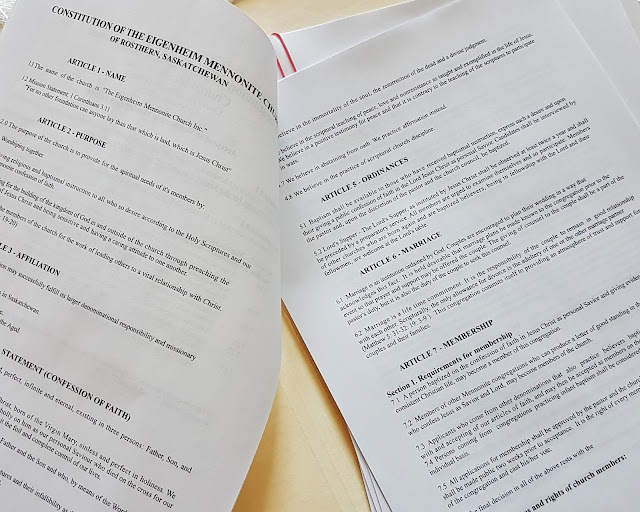Mission statements, bylaws and all that good stuff
 |
| Let's revise our constitution, YAWN |
It matters little how small or large
your institution, organization, church, club or family is, fixing
your constitution and bylaws—beginning with your
mission statement—seems to represent the first task to which we
will ever have to set our collective minds. The mission statement
outlines the reasons for which all of the following bits and pieces
exist, for the “because we want to be this, and accomplish this and
that, we will do our politics this way . . . for now.”
The value in composing mission
statements, goals and bylaws is not in the text they eventually
produce, it’s in the exercise of getting there. The
evidence for that lies in the degree to which the resulting text is
referred to or ignored as time goes by. In many organizations, the
constitution and handbook have been hauled out and altered
occasionally—piecemeal and haphazardly, generally—but most
members are hard-pressed to know where the true, revised copy exists
or what’s actually in it.
My experience has been that we can adopt a very strange relationship
to rules on paper, be they constitutional or confessional. As useful
as following procedures in order to accomplish a mission may be, some
of us can’t get past the reality that the text was written down a
certain time ago by humans and does not exist as binding on
the present; we were not smarter, not more inspired, not more certain
then than we are now. It’s the same “common sense” that allowed
us to write these things that permits us to revise them. No one I
know of has ever declared verbal plenary inspirationi
as the source for our documents of order and yet, we often handle
them as if they were “scriptural,” to be hauled out when they
support an argument, usually an argument against change, in favour of
the status quo.
This might logically raise the question of whether, then, there’s a
good reason for composing mission statements, bylaws, constitutions
or confessions of faith in the first place. To that, I would
reiterate that the value lies not in the documents, it arises from
the exercise of cooperatively, congenially inventing and revising
them. A good metaphor to illustrate this lies in the practice of
regular, physical exercise: the point of that is not to be able to
tick off on paper the kilometres run, the weights lifted, the
stretches and bends; the real point lies in the contribution exercise
can make toward maintaining as healthy a body as possible.
And isn’t that what it’s all about? Mission statements, bylaws,
constitutions, confessions of belief simply constitute agreements to
be a group together, the why and the how? Opting out of a group and
its agreed upon reasons for being is always a possibility. Emigrate,
tear up your membership, leave your church, vacate and set up new
premises, if you like. No nation, organization, institution can
prosper unless its members are willing to define—and redefine—why
it is that they’re together in the first place.
It’s no wonder that we’re reluctant to embark on mission
statement, constitution, confessional, bylaw work. These tasks
require imagination, commitment, perseverance, patience; sticking
with what applied yesterday is generally much more inviting. Fact is,
though, that when this work is done well, it can release the energies
of an organization and produce a rallying of enthusiasm around a
mission.
Poorly done, the opposite effect is bound to emerge: a strait jacket
limiting us to very little beyond what seemed right . . . yesterday.
iEvery
word dictated by God.



Comments
Post a Comment